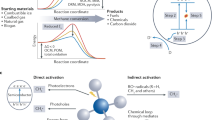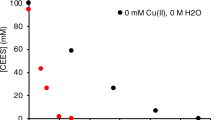Abstract
THE industrial release of hydrocarbons and chlorine-containing organic molecules into the environment continues to attract considerable public concern, which in turn has led to governmental attempts to control such emissions. The challenge is to reduce pollution without stifling economic growth1. Chlorine-containing pollutants are known to be particularly stable, and at present the main industrial process for their destruction involves thermal oxidation at 1,000° C, an expensive process that can lead to the formation of highly toxic by-products such as dioxins and dibenzofurans2. Catalytic combustion at lower temperatures could potentially destroy pollutants more efficiently (in terms of energy requirements) and without forming toxic by-products. Current industrial catalysts are based on precious metals that are deactivated rapidly by organochlorine compounds3. Here we report that catalysts based on uranium oxide efficiently destroy a range of hydrocarbon and chlorine-containing pollutants, and that these catalysts are resistant to deactivation. We show that benzene, toluene, chlorobutane and chlorobenzene can be destroyed at moderate temperatures (<400 °C) and industrially relevant flow rates.
This is a preview of subscription content, access via your institution
Access options
Subscribe to this journal
Receive 51 print issues and online access
$199.00 per year
only $3.90 per issue
Buy this article
- Purchase on Springer Link
- Instant access to full article PDF
Prices may be subject to local taxes which are calculated during checkout
Similar content being viewed by others
References
Mukhopadhyay, H. & Moretti, E. C. Current and Potential Future Industrial Practices for Reducing and Controlling Volatile Organic Compounds (Am. Inst. of Chem. Engineers, Center for Waste Management, New York, 1993).
Green, M. L. H., Lago, R. M. & Tang, S. C. J. Chem. Soc., Chem. Commun. 365–366 (1995).
Spivey, J. J. & Butt, J. B. Catal. Today 11, 465–500 (1992).
Meharg, A. A. & Osbom, D. Nature 375, 353–354 (1995).
Golodets, G. I. Heterogeneous Catalytic Reactions Involving Molecular Oxygen (Studies in Surface Science and Catalysis Vol. 15, Elsevier, Amsterdam, 1982).
Lindberg, R. C., Reedy, J. D. & Yang, K. US Patent No. 4,059,683 (1977).
Mendyka, B., Musialik-Piotrowska, A. & Syzcewska, K. Catal. Today 11, 597–610 (1992).
Callahan, J. L, Grasselli, R. K., Milberger, E. C. & Strecker, R. A. Ind. Eng. Chem. Prod. Res. Dev. 6, 134–142 (1970).
Chatterjee, S., Greene, H. L. & Park, Y. J. J. Catal. 138, 179–194 (1992).
Inamura, S. Catal. Today 11, 547–567 (1992).
Karmakar, S. & Greene, H. L. J. Catal. 151, 394–406 (1995).
Nagata, H. et al. Appl. Catal. B 5, 23–31 (1994).
Author information
Authors and Affiliations
Rights and permissions
About this article
Cite this article
Hutchings, G., Heneghan, C., Hudson, I. et al. Uranium-oxide-based catalysts for the destruction of volatile chloro-organic compounds. Nature 384, 341–343 (1996). https://doi.org/10.1038/384341a0
Received:
Accepted:
Issue Date:
DOI: https://doi.org/10.1038/384341a0
This article is cited by
-
Theoretical investigation of the structure and spectroscopy of uranium oxide species
Theoretical Chemistry Accounts (2023)
-
Simultaneous removal of NOx and chlorobenzene on V2O5/TiO2 granular catalyst: Kinetic study and performance prediction
Frontiers of Environmental Science & Engineering (2021)
-
Catalytic oxidation of ethyl acetate on Ce–Mn–O catalysts modified by La
Rare Metals (2021)
-
Direct observation of pure pentavalent uranium in U2O5 thin films by high resolution photoemission spectroscopy
Scientific Reports (2018)
-
Carbon oxygenate transformations by actinide compounds and catalysts
Nature Reviews Chemistry (2017)
Comments
By submitting a comment you agree to abide by our Terms and Community Guidelines. If you find something abusive or that does not comply with our terms or guidelines please flag it as inappropriate.



